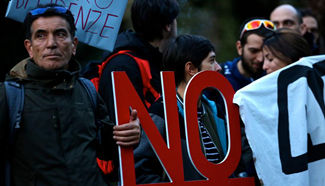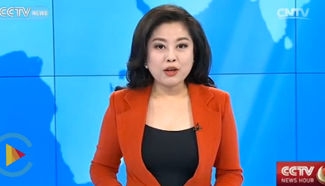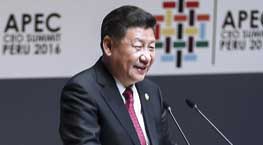SANAA, Nov. 28 (Xinhua) -- Yemen's Shiite Houthi group and its ally of former President Ali Abdullah Saleh's party declared on Monday the formation of "national salvation government," according to an official statement posted on Houthi-controlled state Saba news agency.
The move was taken unilaterally away from their foes of Saudi-backed Yemeni exiled, but internationally recognized government of President Abd-Rabbu Mansour Hadi.
The decision was approved in an official decree released by the Houthi-Saleh join governing council, known as the Supreme Political Council, which ordered the decree to be published on the official gazette.
The new government is headed by Abdulaziz Saleh bin Habtour and 42 ministers, including the information ministry, foreign ministry, defense ministry and interior ministry.
The move came the same day the United Nations envoy to Yemen Ismail Ould Cheikh Ahmed arrived at the Yemeni southern port city of Aden to meet President Hadi to push ahead the peace process between Hadi's camp and its rival Houthis-Saleh camp.
The UN roadmap, which was largely rejected by Hadi for not being based on the UNSCR 2216, called for naming a new vice president after the withdrawal of the Shiite Houthi rebels from the capital Sanaa and other northern provinces and handing over all heavy weapons to a third party.
The UN plan also suggested forming a new government that will include the two-warring sides and will not be led by Hadi who would transfer his power to the new vice president.
But in the 2216 resolution, the Security Council demands that the Houthis withdraw from all areas seized during the latest conflict, relinquish arms seized from military and security institutions, cease all actions falling exclusively within the authority of the legitimate Yemeni government and fully implement previous Council resolutions before moving ahead to form a new joint national unity government between the two warring sides.
The situation in Yemen has deteriorated economically and politically since March 2015, when war broke out between the Shiite Houthi group, supported by former President Ali Abdullash Saleh, and the government backed by a Saudi-led Arab coalition.
Houthis and Saleh's forces hold most of Yemen's northern regions while government forces backed by Saudi-led military coalition share control of the rest of the country including seven southern provinces.
The civil war, ground battles and airstrikes have already killed more than 10,000 people, half of them civilians, injured more than 35,000 others and displaced over three millions, according to humanitarian agencies.










